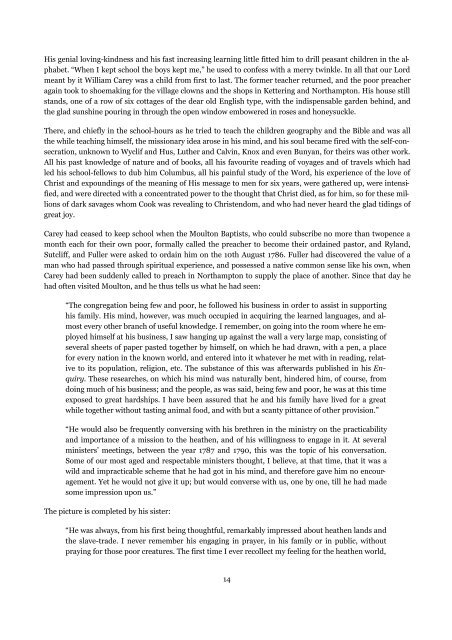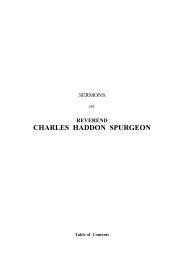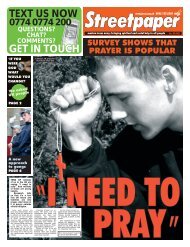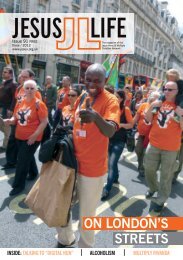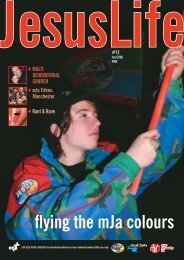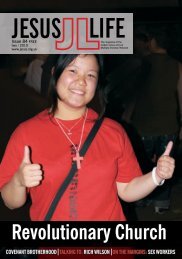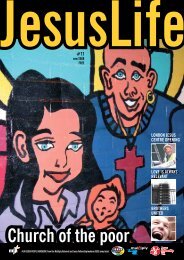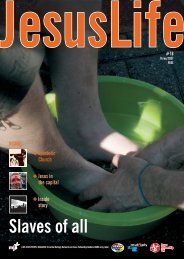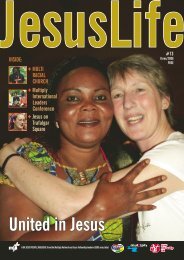Life of William Carey by George Smith - The Jesus Army
Life of William Carey by George Smith - The Jesus Army
Life of William Carey by George Smith - The Jesus Army
You also want an ePaper? Increase the reach of your titles
YUMPU automatically turns print PDFs into web optimized ePapers that Google loves.
His genial loving-kindness and his fast increasing learning little fitted him to drill peasant children in the alphabet.<br />
“When I kept school the boys kept me,” he used to confess with a merry twinkle. In all that our Lord<br />
meant <strong>by</strong> it <strong>William</strong> <strong>Carey</strong> was a child from first to last. <strong>The</strong> former teacher returned, and the poor preacher<br />
again took to shoemaking for the village clowns and the shops in Kettering and Northampton. His house still<br />
stands, one <strong>of</strong> a row <strong>of</strong> six cottages <strong>of</strong> the dear old English type, with the indispensable garden behind, and<br />
the glad sunshine pouring in through the open window embowered in roses and honeysuckle.<br />
<strong>The</strong>re, and chiefly in the school-hours as he tried to teach the children geography and the Bible and was all<br />
the while teaching himself, the missionary idea arose in his mind, and his soul became fired with the self-consecration,<br />
unknown to Wyclif and Hus, Luther and Calvin, Knox and even Bunyan, for theirs was other work.<br />
All his past knowledge <strong>of</strong> nature and <strong>of</strong> books, all his favourite reading <strong>of</strong> voyages and <strong>of</strong> travels which had<br />
led his school-fellows to dub him Columbus, all his painful study <strong>of</strong> the Word, his experience <strong>of</strong> the love <strong>of</strong><br />
Christ and expoundings <strong>of</strong> the meaning <strong>of</strong> His message to men for six years, were gathered up, were intensified,<br />
and were directed with a concentrated power to the thought that Christ died, as for him, so for these millions<br />
<strong>of</strong> dark savages whom Cook was revealing to Christendom, and who had never heard the glad tidings <strong>of</strong><br />
great joy.<br />
<strong>Carey</strong> had ceased to keep school when the Moulton Baptists, who could subscribe no more than twopence a<br />
month each for their own poor, formally called the preacher to become their ordained pastor, and Ryland,<br />
Sutcliff, and Fuller were asked to ordain him on the 10th August 1786. Fuller had discovered the value <strong>of</strong> a<br />
man who had passed through spiritual experience, and possessed a native common sense like his own, when<br />
<strong>Carey</strong> had been suddenly called to preach in Northampton to supply the place <strong>of</strong> another. Since that day he<br />
had <strong>of</strong>ten visited Moulton, and he thus tells us what he had seen:<br />
“<strong>The</strong> congregation being few and poor, he followed his business in order to assist in supporting<br />
his family. His mind, however, was much occupied in acquiring the learned languages, and almost<br />
every other branch <strong>of</strong> useful knowledge. I remember, on going into the room where he employed<br />
himself at his business, I saw hanging up against the wall a very large map, consisting <strong>of</strong><br />
several sheets <strong>of</strong> paper pasted together <strong>by</strong> himself, on which he had drawn, with a pen, a place<br />
for every nation in the known world, and entered into it whatever he met with in reading, relative<br />
to its population, religion, etc. <strong>The</strong> substance <strong>of</strong> this was afterwards published in his Enquiry.<br />
<strong>The</strong>se researches, on which his mind was naturally bent, hindered him, <strong>of</strong> course, from<br />
doing much <strong>of</strong> his business; and the people, as was said, being few and poor, he was at this time<br />
exposed to great hardships. I have been assured that he and his family have lived for a great<br />
while together without tasting animal food, and with but a scanty pittance <strong>of</strong> other provision.”<br />
“He would also be frequently conversing with his brethren in the ministry on the practicability<br />
and importance <strong>of</strong> a mission to the heathen, and <strong>of</strong> his willingness to engage in it. At several<br />
ministers’ meetings, between the year 1787 and 1790, this was the topic <strong>of</strong> his conversation.<br />
Some <strong>of</strong> our most aged and respectable ministers thought, I believe, at that time, that it was a<br />
wild and impracticable scheme that he had got in his mind, and therefore gave him no encouragement.<br />
Yet he would not give it up; but would converse with us, one <strong>by</strong> one, till he had made<br />
some impression upon us.”<br />
<strong>The</strong> picture is completed <strong>by</strong> his sister:<br />
“He was always, from his first being thoughtful, remarkably impressed about heathen lands and<br />
the slave-trade. I never remember his engaging in prayer, in his family or in public, without<br />
praying for those poor creatures. <strong>The</strong> first time I ever recollect my feeling for the heathen world,<br />
14


